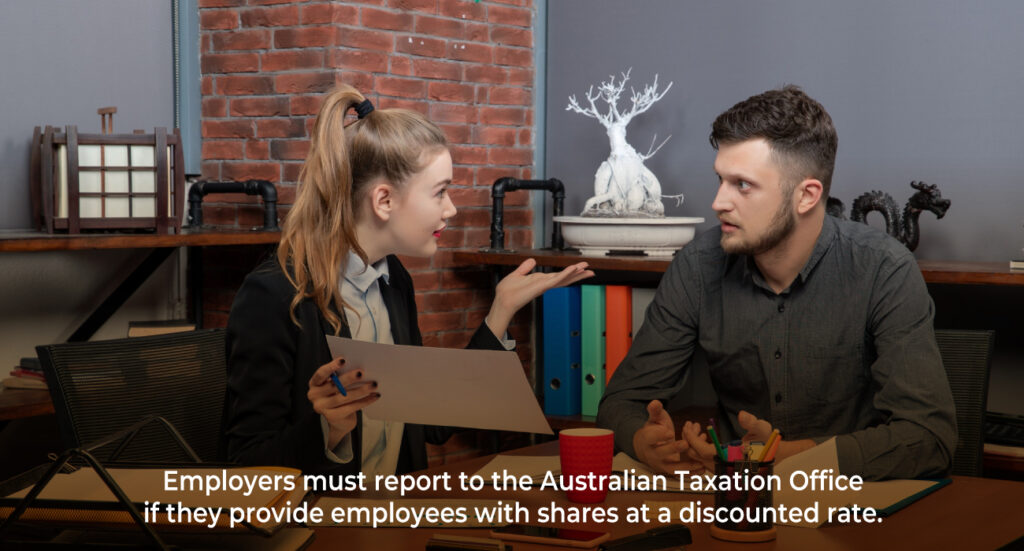Employee Share Scheme:5 Key Tips to Avoid Unexpected Tax Shocks
As a general rule, employers must report to the Australian Taxation Office (ATO) if they provide employees with shares at a discounted rate. Most Australian employers are diligent about this reporting, but occasionally foreign employers with Australian subsidiaries make mistakes, leaving their employees to deal with the fallout.
Initially, I hesitated to write about Employee Share Schemes (ESS), assuming most people were familiar with the tax treatment surrounding them. In Australia, it seemed like common knowledge that you are taxed when you receive shares or rights from your employer. However, when multiple clients question us, ‘Why are we paying tax on the shares that were gifted to us by our employer?’ it made me realize this is something I should address for everyone.

What is Employee Share Scheme (ESS)?
In simple terms, when you receive shares or rights as part of your employment contract or as a gift from your employer, they are considered part of an Employee Share Scheme (ESS). ESS arrangements are particularly popular in the tech sector and among large industries, with many startups offering some form of ESS to their employees.
If you pay for the shares or rights, and the amount is equal to or greater than the market value at the time of acquisition, the shares or rights will not fall under the ESS. Additionally, shares acquired through a salary sacrifice agreement are not considered part of an ESS.
In some Employee Share Scheme (ESS) arrangements, you may have the option to nominate an associate or a related party, such as a family member or a trust, to acquire the shares or rights on your behalf.

What are Tax Implications of Acquiring Shares or Rights from an ESS?
Unexpected Tax Obligations with ESS – It’s important to remember that any benefits you receive from your employer, even in the form of gifts like shares, are generally subject to tax. For many clients, especially in their first year receiving ESS, it comes as a shock when they see a tax payable in their tax return. While employers take tax out of regular pay for an employee, they usually don’t withhold any tax when an employee receive shares through an ESS. This leaves employees having to pay the tax themselves, often out of pocket, even though the income hasn’t been received in cash.
Bonus, Gift & Discounted Shares – If you are allocated shares as a bonus, gift, or at a discounted rate, you must include them as part of your assessable income. When you receive shares or rights at a discount, the value of the discount will be included in your taxable income. If your employer does not provide a tax statement or fails to report the ESS to the tax office, it is important to follow up with your employer to understand why it was not reported. In Australia, all employers are required to report ESS allocations at the end of the financial year.
Example: In 2024FY, Sarah receives 800 shares from her employer, TechCorp, at no cost. The market value of each share is $2.50, making the total value $2,000. Since she received these shares for free, the $2,000 is considered a discount and must be included in her assessable income for the year.
Allocating Shares to an Associate – If you arrange for an associate, like a family member, to acquire shares or rights from an ESS related to your employment, the tax law still requires you to include the discount in your assessable income, not your associate’s.
Example: In 2024, James negotiates for his spouse, Emma, to acquire 700 rights from his employer, FinTech Solutions, as part of his remuneration package. Even though Emma acquires the rights, they are related to James’s employment. Therefore, James must include the discount on these rights in his assessable income for the 2024 income year.
Qualifying Shares – Different tax rules apply to qualifying shares, which are usually ordinary shares in a company. To qualify, an employee cannot hold more than 5% of the voting shares. Generally, the taxing point for these shares can be deferred for up to 10 years, or until the “cessation time” occurs. The cessation time refers to when there are no longer any restrictions preventing the employee from selling the shares.
You may be able to get a $1,000 exemption on your qualifying shares if you elect to be taxed on the discount upfront and the ESS meets the following conditions: no forfeiture or disposal restrictions for at least three years, and the scheme is non-discriminatory, open to at least 75% of permanent employees.

What Are the Capital Gains Tax Implications for the Disposal of Shares or Rights Acquired from an Employee Share Scheme (ESS)?
A capital gain is the profit you make when you sell an investment, like shares, for more than what you originally paid. The difference between the sale price and the total cost of acquiring the asset, known as the cost base, is your capital gain. For shares or rights acquired through an Employee Share Scheme (ESS), the cost base includes both the amount you paid and any discount that was taxed upfront. No matter how the discount was taxed, if you hold the shares or rights for 12 months or more, you can qualify for a 50% discount on any capital gains when you sell them.
30 Days Rule – There are specific rules if you dispose of shares or rights after the cessation time (when restrictions on selling them are lifted). If you sell within 30 days of the cessation time, any capital gain or loss is disregarded since the discounted value has already been taxed as part of your assessable income in that income year. However, if you sell the shares or rights more than 30 days after the cessation time, you will need to account for any capital gain or loss based on their market value at cessation time, as this was the amount taxed in the relevant income year. This value, on which you paid tax, becomes your cost base, and any subsequent gain or loss will be subject to CGT.
Cost Base Calculation – The Capital Gains Tax (CGT) implications for shares or rights acquired through an Employee Share Scheme (ESS) are determined by how the discount was treated at the time you received the shares or rights. If the discount was “assessed upfront,” meaning the difference between the market value and the price you paid was included in your assessable income at the time, this amount will form part of the cost base for CGT purposes. In addition to the discount that was taxed, any amount you paid to acquire the shares or rights is also included in the cost base.

Pro Tips to Manage ESS Taxing
Be Prepared for the Good, the Bad, and the Ugly – The good side of an Employee Share Scheme (ESS) is that you get to share in the company’s growth, where you’re investing your time and effort. The bad side is the income tax—you are required to pay tax at your marginal rate on any shares you receive through the ESS. If your employer hasn’t provided an ESS statement or didn’t report it to the ATO, contact them for clarification. The ugly side is that even if you’ve paid tax on the full market value of the shares, you could end up losing value or making a capital loss on the shares.
Manage Cashflow – If you’re planning to hold onto your shares for long-term investment, it’s crucial to consider the cashflow implications. Remember, even though the shares are not a cash payment, you’ll still need to pay tax on them. The marginal tax due on the Employee Share Scheme (ESS) must be paid in cash. One option to ease the cashflow burden is to sell some shares as soon as the cessation time occurs, which can help cover your tax liabilities without putting a strain on your finances.
As Martin Eberhard, co-founder of Tesla Motors, wisely advised: “The minute you have liquidity, sell half. It’s not a vote of confidence against the company to diversify.”
Consider Holding the ESS in a Trust Structure – After paying the necessary taxes, you might want to consider selling the shares within a trust structure, ideally within 30 days. This can help you avoid incurring Capital Gains Tax (CGT) at that point, while also offering the benefit of holding the shares in a more protected and tax-efficient environment for future growth.
In conclusion, Employee Share Schemes (ESS) offer employees an opportunity to share in the growth of their company, but they also come with significant tax implications that need careful management. From understanding the upfront tax assessment on discounted shares to managing capital gains when you sell them, navigating ESS tax rules can be complex. If you’re unsure about how your ESS is treated or need guidance on strategies to minimise tax liabilities, it’s always a good idea to seek professional advice. Contact Investax Tax Specialists today for expert advice on how to handle your Employee Share Scheme and optimise your tax position.
General Advice Warning
The material on this page and on this website has been prepared for general information purposes only and not as specific advice to any particular person. Any advice contained on this page and on this website is General Advice and does not take into account any person’s particular investment objectives, financial situation and particular needs.
Before making an investment decision based on this advice you should consider, with or without the assistance of a securities adviser, whether it is appropriate to your particular investment needs, objectives and financial circumstances. In addition, the examples provided on this page and on this website are for illustrative purposes only.Although every effort has been made to verify the accuracy of the information contained on this page and on our website, Investax Group, its officers, representatives, employees and agents disclaim all liability [except for any liability which by law cannot be excluded), for any error, inaccuracy in, or omission from the information contained in this website or any loss or damage suffered by any person directly or indirectly through relying on this information.





